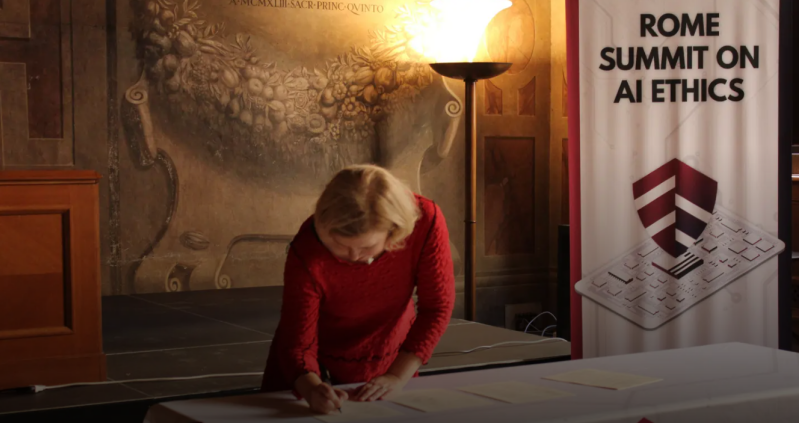
Christian and Jewish leaders have signed a landmark interfaith declaration urging that Artificial Intelligence be developed and deployed within ethical boundaries that preserve human dignity, prevent harm, and ensure the technology remains under human control.
Kristine Torjesen, President of BioLogos, the faith and science think tank founded by world-renowned biologist and apologist Francis Collins, signed the Joint Statement on Ethics and Artificial Intelligence at a summit about the issue hosted by the American Security Foundation in Rome on Oct. 23.
Other signatories included Rev. Dr. Walter Kim, President of the National Association of Evangelicals, Rev. Johnnie Moore of the Congress of Christian Leaders, Gabriel Salguero of the National Latino Evangelical Coalition, Micah Goodman of the Shalom Hartman Institute and Rabbi David Bashevkin of 18Forty, among others.
“As Jewish and Christian religious leaders, scholars, and advocates, we have gathered in Rome to add our voices to what Pope Leo XIV has called to be ‘serene and informed conversation’ about the advancement of artificial intelligence (Al),” read the leaders' statement.
“We believe that all people, having been formed in the image and likeness of our Creator, are imbued with inherent dignity, fundamental rights, capacity to co-create with the Divine, and responsibility-to the Divine and to ourselves-to steward our humanity and our world.”
The statement further explained that in 1948, after two world wars, fundamental human rights were codified by the Universal Declaration of Human Rights (UNDHR) by the United Nations. These rights have since been extended in the area of technological advancement and remained significant.
“Now, in the era of rapidly developing AI, we believe it is incumbent, not only on companies and governments, but on people of faith, who number more than 6 billion worldwide, to respect, protect, and advance human dignity, rights, and flourishing by ensuring that AI is-and remains secure, safe, ethical, and under human control,” added the statement.
Citing the late Pope Francis’ "Rome Call for AI Ethics” in 2020, the leaders stated AI advancement must reflect true progress both for the human race and Planet Earth, with three related requirements: “it must include being inclusive of every human being, discriminating against no one," "have the good of humankind and the good of every human being at its heart," and "be mindful of the complex reality of our ecosystem."
The faith leaders want AI to reflect human values and therefore signed the statement calling for five essential principles: for the technology to be accurate, transparent, allow privacy and security, alongside human dignity and for the common good.
The statement also called for the “independent evaluation of AI systems, safeguards to protect children and other vulnerable people, and vigilance so that AI never replaces human relationships or moral responsibility,” as noted by Torjesen in a post-summit article for BioLogos.
“AI is shaping human relationships profoundly-with each other, our labor, and our world,” the statement by faith leaders read.
“But unreliable AI is harming human relationships equally profoundly. Authoritative AI systems are subordinating human judgment and agency. Biased AI systems are perpetuating human discrimination and inequality, disproportionately harming vulnerable populations. And efficiency focused AI systems are denying humans crucial nuances, especially in considering complex questions and completing intricate tasks.”
The leaders also called for “discernment and wisdom” for spiritual matters when approaching AI, with the idea that technology will enhance and not diminish spiritual life.
“Above all, we must refuse to idolize or worship AI, no matter its achievements,” added the leaders.
“As Al companies race to develop AI that moves beyond tools to build superintelligence — AI that can outperform all humans at most cognitive tasks — humans must agree on our collective moral red line: we must not develop superintelligence until we agree it is safe, controllable, and desired by the broader public. Only by remaining a tool for humans can AI truly serve humanity.”
In the separate article for BioLogos, Torjesen said that AI, as with most technology, can be used for “great good or great harm, but it’s not neutral.”
“It’s already changing the way we live, learn, and relate to one another,” she opined.
Torjesen explained why she signed the statement on behalf of BioLogos. She said that AI posed a technological challenge for Christians to fulfill the mandate to love our neighbor (Mark 12:31), protect the least of these (Matthew 25:40), and care for God’s creation (Genesis 2:15).
“Leveraged responsibly, AI can help us overcome the major environmental and health problems we face. But if we use it without care, we won’t just fail to solve these issues. We will exacerbate them further,” said Torjesen.
“BioLogos joined other faith leaders in Rome because, with so much at stake, we must ensure that AI is used in ways that reflect our faith and uphold human dignity.”
Torjesen pointed out that with millions of people asking AI systems such as ChatGPT questions about life every day, the AI is “undoubtedly” shaping how humanity sees the world and each other.
“And when these AI systems answer with bias or without nuance, their massive and growing influence can hinder human flourishing,” she said.
“This is particularly true for vulnerable populations, who may be misrepresented or misled by AI systems.”
Torjesen, highlighting other concerns, wrote of AI-enabled facial recognition technology being used to locate, arrest, and harm ethnic and religious minorities.
“As AI continues to develop, we should also ask how it will be integrated into military action across the globe,” she said.
“To ensure safety and security, states must make AI a tool of protecting civil rights, not violating them. That means refraining from using AI systems to surveil citizens and working to stop manipulations of AI that encourage violence against humans. Crucially, the international community must also come together to ban the use of AI to autonomously wage war.”
“AI should be developed in alignment with a robust understanding of human dignity, one that takes into account our faith, emotions, culture, work, and environment,” she added.






